Konstantin Hryhorenko, the head of the multimedia publication Obrii Iziumshchyny, lived 50 kilometers away from the frontlines for eight years. In 2014, his hometown welcomed its first refugees from the East, both wounded and deceased. Back then, as a journalist, he had no idea that a few years later, the war would force him out of his home, and days and nights would blur in complete despair.
“On the front page, we reported the news of Russia launching a large-scale invasion of Ukraine.”
Konstantin recounts how his daughter called him early in the morning from Kharkiv. She sounded scared as she mentioned the intense shooting in the area. Konstantin and his wife quickly checked the news and learned that Putin had declared a “special operation” during the night.
After reading the news about the war, the journalist still went to work because the editorial team was preparing to print the newspaper’s next issue. And the residents of Iziumshchyna did see that edition.
— On the front page, we reported the news of Russia launching a large-scale invasion of Ukraine. Then, as a team, we gathered to plan and decided to work remotely in the following days until the situation was resolved. We had prior experience working remotely during the pandemic, so it made it easier for us. We couldn’t just stop our work because other media outlets in our region started closing one by one, and Obrii Iziumshchyny remained a breath of fresh air for the city’s residents, — the interviewee shares.
“My wife received a message from acquaintances on her phone, stating that unknown people were inquiring about who is Konstantin Hryhorenko”
In the early days of the war, the city constantly trembled from explosions. Russian rockets flew one after another, destroying everything in their path.
— They targeted a residential building – I want to emphasize this point: not an administrative building, not a military facility, but an ordinary apartment complex. I remember that we went to the scene that day, recorded a report with photos and videos, spoke to people, but we couldn’t publish the next issue because the shelling didn’t stop even for a moment, — says Mr. Hryhorenko. Everything imaginable was flying – the most terrifying were planes and air raids. There were also artillery, rocket launchers, and tanks.
Darkness enveloped the city. All the blessings of civilization vanished, yet Konstantin still hesitated: should he stay or leave? But one message helped him quickly make up his mind.
— My wife received a message from acquaintances on her phone, stating that unknown people were inquiring about who is Konstantin Hryhorenko. I am grateful to my spouse, as she said, ‘Stop, we can’t continue like this. This is not a joke, and we should not play around with this. They will find you regardless. Either they will force you to work for the occupying authorities, or we must leave as soon as possible.’ And you know, we felt it was right. — says Konstantin. As a result, he and his wife decided to leave Izium on March 4th, just before hostile forces occupied the city.
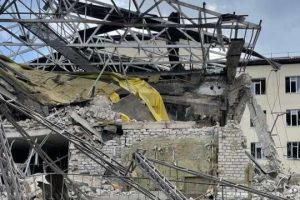
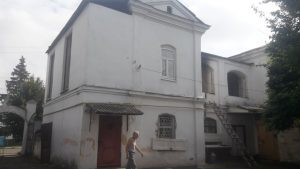
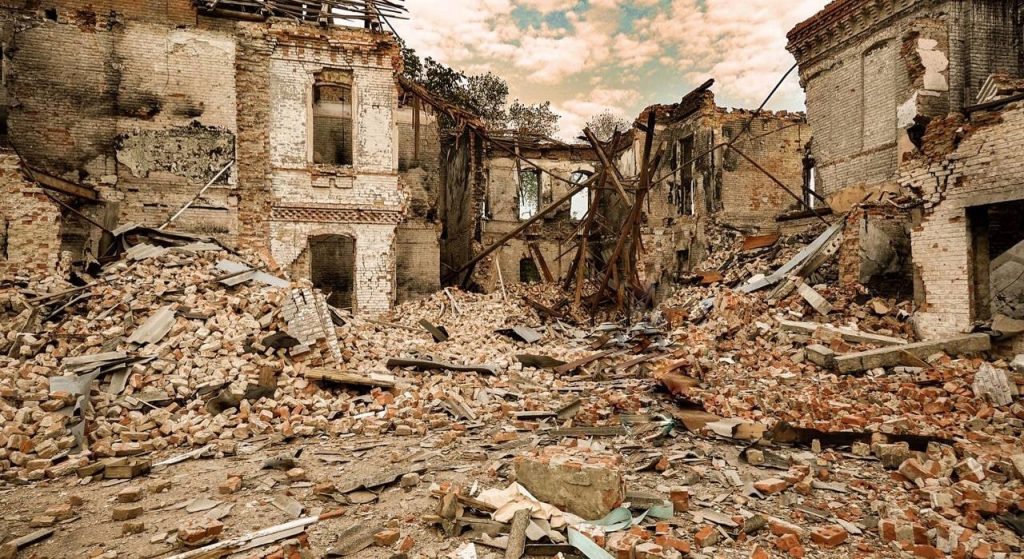
Konstantin didn’t know which city his fate would lead him to. He traveled westward in the country to meet his daughter and little granddaughter. After two exhausting days on the road, they reached the Lviv region. In the town of Busk, the editor of the newspaper Volya Narodu, Mykola Ivantsiv, provided them with shelter. Over time, Konstantin began conducting training sessions for fellow journalists who were also displaced. The goal was to help them quickly get back on their feet and not succumb to depression.
Since 2015, Konstantin has been working as a personal consultant for media programs at the Council of Europe in Ukraine. He participated in various programs, conducted training sessions with editors of local media, and engaged in educational activities to reorganize media outlets. With the help of the Lviv Center for Journalistic Solidarity and the National Union of Journalists, he successfully held three seminars for colleagues in Lviv, Chernivtsi, and Ivano-Frankivsk. He shared his own experiences with physical and digital security, providing practical insights rather than relying solely on theoretical methodologies taught by European Union trainers.
Konstantin didn’t abandon his journalistic activities entirely; he continued to manage a website on social media platforms. However, he faced challenges when unknown attackers attempted to sabotage his website twice.
The first DDoS attack occurred in March, leading to the site’s temporary blockage. Through extensive efforts and reaching out to his colleagues, Konstantin managed to recover the site, but another attack occurred in the summer. Seeking professional help, he contacted the Laboratory of Digital Technologies through Internews Ukraine, and their experts helped secure the website and restore its full functionality. Based on his experiences, Konstantin strongly advised his colleagues to protect their resources seriously.
“Imagine how people felt when they received their Ukrainian newspaper after months of daily mass Russian propaganda.”
On September 10th, there was a heartening update from his homeland – the Ukrainian flag was raised over Izium. With assistance from the State Committee for Television and Radio Broadcasting, the editorial team quickly prepared the first edition of Obrii Iziumshchyny after a long hiatus.
— I honestly didn’t expect it to happen so quickly, but the Lviv colleagues were a tremendous help. They involved layout designers and graphic designers, and within two days, we printed around 5000 copies. On September 16th, volunteers delivered the copies to the people of Izium. This issue was crucial not only in terms of ‘big’ politics but also for local life. Imagine how people felt when they received their Ukrainian newspaper after months of daily mass Russian propaganda. In this edition, we included messages from the military administration head, the city administration leader, and details about the President of Ukraine’s visit to Izium – information that people didn’t know before. On the front page, I published photos of destroyed buildings, and there was information about collaborators, as many people were unaware of these facts, — shared Konstantin.
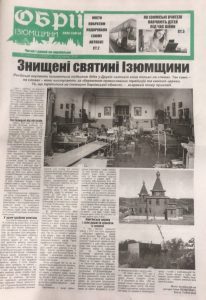
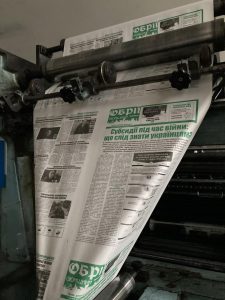
Konstantin felt a deep attachment to his homeland, and in October, he decided to return to his hometown and his editorial office for a few days. The air was filled with a sense of victory, but chaos and remnants of the ‘Russian world’ were still evident.
The sight of the ransacked editorial office, without windows and doors, made it clear that the enemy had occupied it. In their garages, which were used to store vehicles, there were now stockpiles of enemy ammunition. It was a painful sight, but Konstantin remained resolute that they would rebuild and return. The determination and encouragement from people who were eager for the journalists to continue their work added strength to Konstantin’s resolve.
Throughout the war and even after the liberation of Kharkiv Oblast, Konstantin never considered abandoning his profession or shutting down the publication.
— You know, someone once asked me if I ever considered leaving my job after everything I’ve been through. But now, more than ever before, I take immense pride in being a journalist. I have felt firsthand how important journalists are, especially during times of war. Living 50 kilometers away from the conflict, I didn’t fully grasp its significance. However, now that my city is devastated and destroyed, and I know my fellow countrymen’s suffering, I perceive everything differently. I am convinced that the journalism profession will rank among the top, if not at the very top, in terms of societal trust in the future. It is an immensely responsible and vital mission. Even amidst the challenges and dangers, I feel a deep sense of purpose and commitment to continuing this important work, — concluded the journalist.
This article features the experiences of journalist Konstantin Hryhorenko, who lived near the frontlines of the Russian invasion of Ukraine. It highlights his challenges and dangers while reporting during the war and his determination to continue his journalistic work. The article emphasizes the vital role of journalists in times of conflict and their responsibility to provide accurate information to the public.
This series, titled Executed Free Speech, is created as part of a project Drawing Ukrainian And International Audience’s Attention To Serious Violations Of Human Rights And Crimes Against Journalists And Mass Media By The Russian Federation, which is performed by the National Union of Journalists of Ukraine, with support from the Swedish non-profit organization Civil Rights Defenders.
JOURNALISTS ARE IMPORTANT. Stories of Life and Work in Conditions of War is a cycle of materials prepared by the team of the NUJU with the support of the Swedish human rights organization Civil Rights Defenders.
#CRD

 THE NATIONAL UNION OF
JOURNALISTS OF UKRAINE
THE NATIONAL UNION OF
JOURNALISTS OF UKRAINE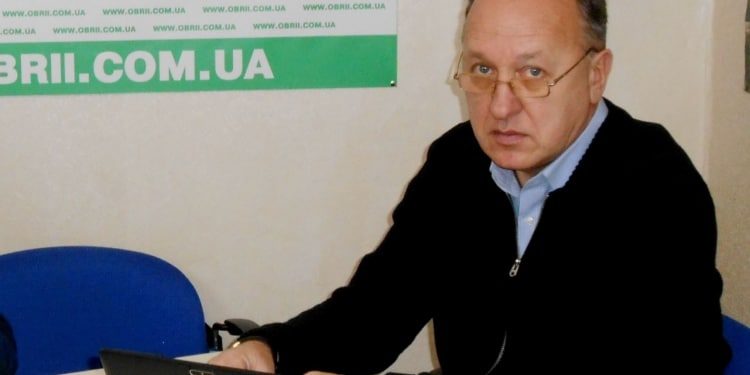
















Discussion about this post